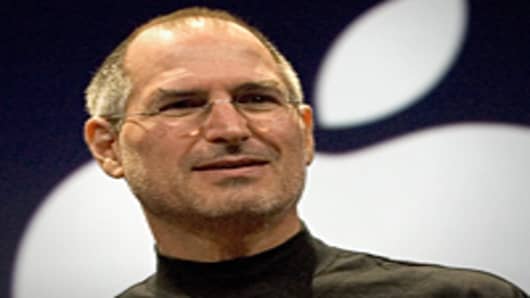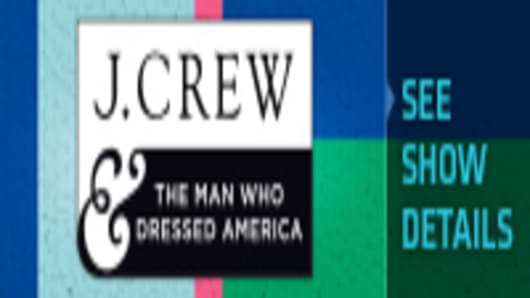Apple’s retail stores are a physical reminder that the brand is the world’s most profitable technology company. They are also part of Steve Jobs’ legacy. However, the stores’ success is also thanks in part to someone outside the company — J. Crew’s CEO Mickey Drexler. It wasn’t the first time the two collaborated. At the time of Jobs’ death in October, the pair had worked together for more than a decade, with each serving on each other’s board, sharing advice and insights.
“Steve became the best merchant in world,” said Drexler. “He put together the best goods. He articulated them in an extraordinary way, online and in retail stores. He designed the most beautiful stores in the world.”
When Drexler joined Apple’s board in 1999, Jobs made the announcement at Macworld in New York.
"We've got a great board and Mickey's going to make it even better," Jobs told the crowd at the Javits Center.
What Jobs didn’t announce was the reasoning behind the board appointment. He had selected Drexler, a merchant with retail savvy to rival his own, for a specific purpose. At the time, Apple depended on big box retailers to sell its product, but Jobs dreamed of controlling the product from conception to sale, and he needed his own retail stores to do so.
Drexler, who began his career buying goods for department stores, told CNBC’s David Faber, “You want to control your distribution. It was actually my career lesson.”
Jobs saw Drexler as his kindred spirit in the philosophy of retail. In Walter Isaacson’s biography of Jobs, Drexler recounts, “I couldn’t stand not controlling my own product, from how it’s manufactured to how it’s sold. Steve is just that way, which is why I think he recruited me.”
Their working relationship expanded when Jobs joined the Gap board later in 1999, during Drexler’s leadership at the company. Drexler had been given the title “King of Retail” during his tenure at the Gap from 1983 to 2002, transforming it from a $400 million business to a $14 billion behemoth. The business got too big, too soon, however, and profits took a dive. Drexler was fired in May 2002, but not before Jobs called him the night before and warned him.
“He was so empathetic with me when I got fired, 'cause he was on the Gap board,” Drexler recalled. “And … he said, ‘It happened to me. I feel badly for you.’"
Drexler moved on to become the CEO of J. Crew, and is on Apple’s board to this day. His influence on Apple’s stores is unmistakable. The look and feel of the typical Apple store closely resembles that of the Gap stores that Drexler developed: open, airy floor plans, and the utilization of simple building materials such as wood and steel. Drexler’s greatest contribution to Apple’s retail business, however, was his insistence that they get it right on the first try.
Ron Johnson, CEO of J. C. Penney and former senior vice president of retail for Apple, first met Drexler when he was also brought on to develop the Apple stores.
He recalled Jobs telling him, “‘You got to talk to Mickey.’ Because, you know, Steve wanted to make sure he hired a good retailer. And he trusted Mickey's judgment. … He turned to Mickey for things that related to product or price points or the retail stores. Mickey had very unique insights to add because of his intuition and his experience.”
That intuition came into play when Drexler suggested building a mock-up of an Apple store, well before the company broke ground on the first location in Tyson’s Corner, Va.
Johnson recalled Drexler’s argument. "You’ve got to do a mockup, because you have to feel a store. You know, it's not like a product that you design; you’ve got to feel the space." And he said, ‘It's the best investment you'll ever make.’ And we did a mockup. And he was exactly right.”
The prototype store became, according to Isaacson’s book “Steve Jobs,” a haven where Jobs, with his visual approach, could come up with innovations by touching and seeing the options as they evolved. “I loved to wander over there on my own, just checking it out,” Jobs told Isaacson.
Apple stores are now some of the most recognizable and profitable in the retail world and serve as a standing testament to the successful partnership of Drexler and Jobs.
As for Drexler, he has led J. Crew to an unprecedented level of success for the brand. In 2011, the company had nearly $2 billion in sales. He still considers Jobs a major influence on his career and life.
When asked for his take-away from his years on the Apple board, Drexler replied, “Being on the board of Apple influenced me importantly for the last, almost 13 years now. … The takeaway is, really just have a huge conviction about what you do and don’t be afraid.”
And, of course, he misses the man who has inspired him so much.
“I miss his inspiration. You know, just by listening. And, you know, I think America misses him,” he said. “He was a force in the consumer world and in how it's changed people's lives.”
A previous version of this story misstated the amount of time Jobs and Drexler worked together and clarifies when Jobs joined Gap's board.



